Babies are born with a limited amount of energy that they need to use for things like growth and development. Some infants are ready to start eating solids as early as 6 months old, while others may not be ready until they are closer to 7 or 8 months old. According to the American Academy of Pediatrics, a good rule of thumb is to start feeding your baby solids when he or she can sit up without support and has started to develop a pincer grasp. This usually happens around the same time that babies start to teeth.
Some parents may be introducing highly allergenic foods without knowing it. So, it’s important for parents to know the signs and symptoms of a food allergy in babies. These can include things like hives, wheezing, vomiting, and diarrhea. If your baby has any of these symptoms after eating a certain food, you should stop feeding them that food and contact your doctor. In this blog post, we will discuss when babies can eat solid food and what are some signs that your baby is ready for solid foods. So read on to learn more!
In This Article
When do babies start solid foods?
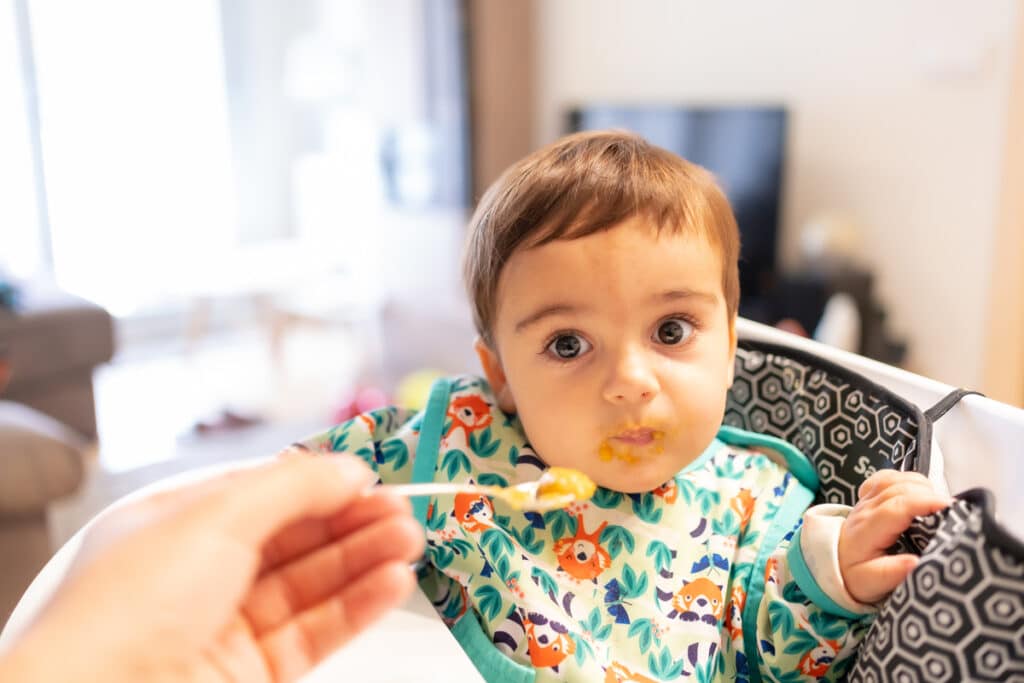
As we said above baby can start solid foods from around 6 months old. This is when they have good head control and can sit up unaided. Before this, babies aren’t ready to eat solids because they can’t control their heads and their body isn’t ready to digest food properly.
Some parents choose to start earlier than 6 months, but it’s generally not recommended. If you introduce solid foods too early, your baby’s immature digestive system may not be able to cope and this can lead to tummy upsets. Your baby may also find it difficult to swallow food and they are at risk of choking.
Around 8 to 9 months you can start to give your baby some finger foods. These are small pieces of soft food that they can pick up and eat themselves. At first, they will just gum the food, but as they get a little older (around 10 to 12 months) they will start to use their teeth to bite off pieces. Babies usually start to eat less breastmilk or formula once they start on solid foods. By the time they’re 1 year old, most babies are eating 3 regular meals a day and are having less breastmilk or formula.
Moreover, make sure to avoid potentially allergenic foods like hot dogs, soy products, fish, eggs, peanuts, and cow’s milk during the first year. You can give scrambled eggs when your baby is around 6 to 8 months old, but make sure they’re fully cooked and not runny. Breast-fed infants’ can be able to start solid foods a little earlier than formula-fed infants. But it depends on your baby, so consult with your baby’s doctor before starting solid foods.
How do you know your baby is ready for solid foods?
Baby shows many signs when he or she is ready to start eating solids and they are:
Be able to sit up with support: Your baby should be able to sit up with support and have good head control before starting solids. Also, they should not lean forward or back when sitting up.
Have lost the tongue-thrust reflex: The tongue-thrust reflex is when a baby automatically pushes food out of his or her mouth with their tongue. This reflex usually goes away around 4 to 6 months old, which means your baby is ready to start eating solids.
Show an interest in food: Your baby should be interested in what you are eating and try to grab your food. They may also try to put everything they can find into their mouth.
Be able to chew and move food around their mouth: Before starting solids, your baby should be able to move food around in their mouth and chew. They may not have teeth yet, but they should be able to mash food with their gums.
Be able to swallow food: Your baby should be able to swallow food before starting solids. You can tell if they are ready to swallow by seeing if their tongue to push food to the back of their mouth and then down their throat.
Be able to sit in a high chair: Your baby should be able to sit in a high chair before starting solids. This will help them stay upright and not fall out of the chair while eating.
Note: When you start feeding your baby solids, it is important to start with easy-to-digest foods such as rice cereal or oatmeal. When your baby is 8-10 months old you can start with single-grain infant cereals just start by mixing 1 to 2 tablespoons of cereal with breast milk, formula, or water. Another good first choice is iron-rich pureed meats.
Feed your baby with a small spoon and never put cereal in a bottle unless your doctor recommends it. Most babies need to eat 3-4 times a day by 6 months of age. So, make sure the food groups you introduced to them are part of every meal and snack. If they have any allergic reactions to any foods, stop feeding them that food until you speak with a doctor. {1}
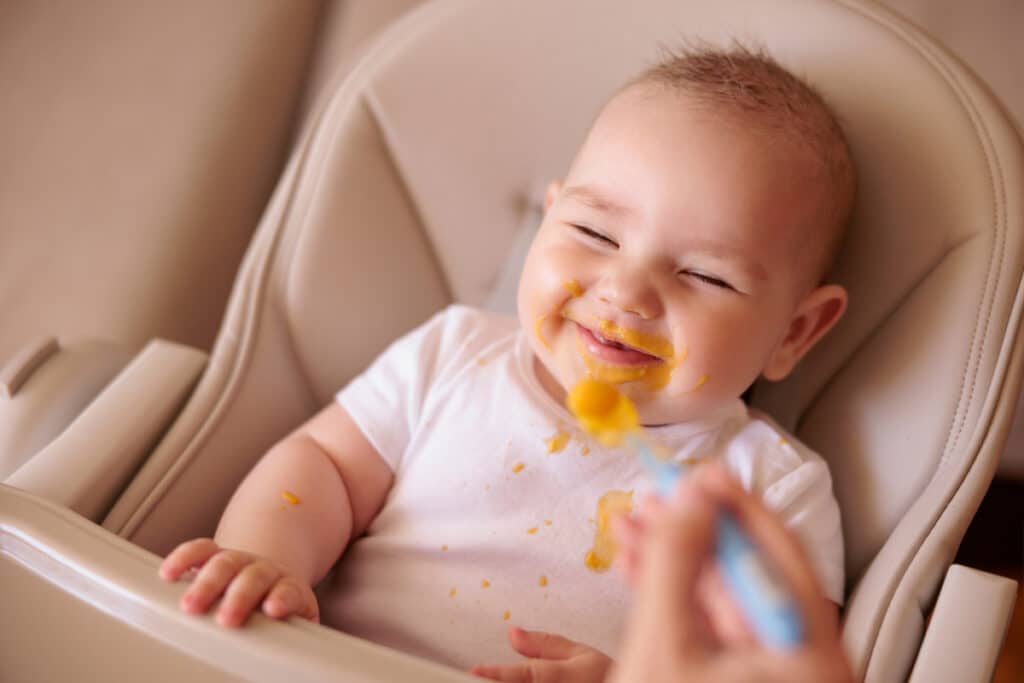
Which solid food you should give your baby at 6 months?
Generally, start with a single-grain, iron-fortified baby cereal with infant formula. Rice cereal has long been the first food for infants, but you can start with any other single-grain, iron-fortified cereal. Look for a cereal that contains at least iron, folic acid, and other B vitamins. {2}
If you are concerned about arsenic in only rice cereal, whole-grain oatmeal or barley cereals are good alternatives. You can also start with a mixed grain cereal that contains several different grains. Start with 1 or 2 tablespoons of cereal mixed with breast milk, formula, water, or even with a pureed fruit. Below are some best options of pureed foods you can give to your baby and they are:
Sweet potato: When you’re introducing new foods to your baby, always start with a small amount to test for allergies. If you don’t see any reaction after a few days, you can give sweet potatoes more often. This food is an excellent source of beta-carotene, which the body converts into vitamin A. Vitamin A is important for the proper development of the eyes, skin, and immune system.
Avocado: Avocados are a great first food for babies because they’re packed with healthy fats, vitamins, and minerals. They’re also easy to digest. Start with a puree of avocado mixed with breast milk or formula. You can also add pureed avocado to other baby foods you’re already feeding your baby.
Banana: Bananas are a good source of potassium, vitamin C, dietary fibre, and other nutrients. They’re easy to digest and have a sweet taste that most babies enjoy. You can start feeding your baby banana at around 6 months old. You can start with a small amount of pureed or mashed banana and gradually increase the amount.
Pumpkin: If you want to give iron-rich foods to your baby, then start with pureed pumpkin. You can give it to your baby from six months old. For your own baby food, pumpkin, and carrots vegetables are easy to digest and full of nutrients like vitamin A, which is essential for a baby’s vision development.
Yogurt: You can give yogurt to your baby from around 6 months old. It’s a good source of protein, calcium, and other nutrients. Choose plain yogurt with no added sugar. You can give your baby full-fat or reduced-fat yogurt. In your baby’s diet, yogurt can be a good alternative to milk or your can give this with your infant formula also.
Mashed Fish: You can give mashed fish to your baby from around 6 months old. It’s a good source of protein, omega-3 fatty acids, and other nutrients. You can give your baby mashed fish that has been cooked in water or steamed. Avoid giving your baby fried fish or any fish with bones in it. If you’re unsure about giving your baby fish, talk to your doctor or midwife.
Which is best breast milk or formula milk for a child?

There is no consensus on which is best for a child, breast milk or formula. Some people believe that breast milk is best because it contains all of the nutrients a baby needs and also because it helps to bond between mother and child. Other people believe that formula is just as good as breast milk because it is nutritionally complete and (for some babies) easier to digest. Still, others believe that either breast milk or formula can be fine, as long as the baby is getting enough nutrition and hydration. Ultimately, 0-3 months of breast milk is considered best for the baby. But if the baby has any trouble with breastmilk, then the use of the formula is suggested.
Can you give your 4-month-old banana baby food?
Yes, you can give your 4-month-old banana baby food. Bananas are a great source of dietary potassium and vitamin C, both of which are important for a baby’s growth and development. They also contain dietary fiber, which can help with bowel regularity.
When purchasing bananas for your baby, look for those that are yellow with a few brown spots. This indicates that the banana is ripe and will be sweet and flavorful. Avoid buying bananas that are green or overly ripe, as they will be sour and not as palatable to the baby.
You can mash up a ripe banana and mix it with breast milk or formula to make a smoothie-like consistency, or you can simply give your baby the banana whole to gum and mash on their own. If you’re introducing bananas as a first food, start with just a small amount to gauge the baby’s reaction and tolerability. From there, you can slowly increase the portion size as tolerated.
Is it better to start solids at 4 months or 6 months?
There is no one “right” answer to this question. It depends on the individual child and his or her specific developmental stage.
Some babies are ready to start solids at 4 months old, while others may not be ready until 6 months or even later. The best way to know if your baby is ready for solids is to watch for signs that he or she is ready, such as being able to hold up his or her head, having good hand-eye coordination, and showing an interest in food.
If you’re not sure whether your baby is ready for solids, it’s always best to consult with your pediatrician.
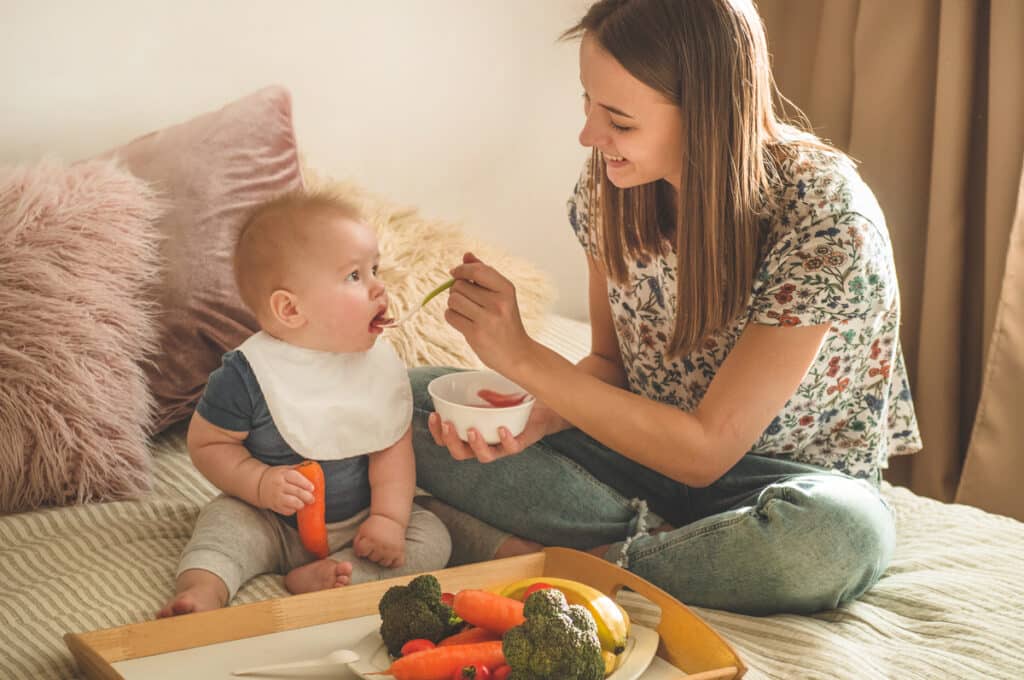
What happens if you start solids too early?
Starting solids too early can lead to a variety of problems. First, your baby’s digestive system is not developmentally ready to handle solids. This can lead to tummy aches, constipation, and diarrhea. Second, starting solids too early may cause your baby to become overweight later in life. Third, starting solids before 4 months increases the risk of developing food allergies. Finally, starting solid foods before 6 months old puts your baby at risk of choking. So make sure you talk to your doctor before making the decision to start solid foods!
The Bottom line
As well as babies begin eating solid foods earlier than the traditional 6-month mark, some experts now recommend that parents start to think about introducing solids as early as four months old. At this stage, breastmilk or formula should still be your baby’s main source of nutrition, but small amounts of soft, mashed, or pureed food can be introduced to the baby. Therefore, according to the American Academy of Pediatrics, it is best to wait until your baby is at least 6 months old before introducing solid foods. However, you may start earlier if your baby shows signs of readiness, such as sitting up well without support, taking interest in food, and reaching out for food. If you have any concerns, it is always best to speak to your doctor or pediatrician. We hope the above article has given you some clarity on when can your baby eat solid food.

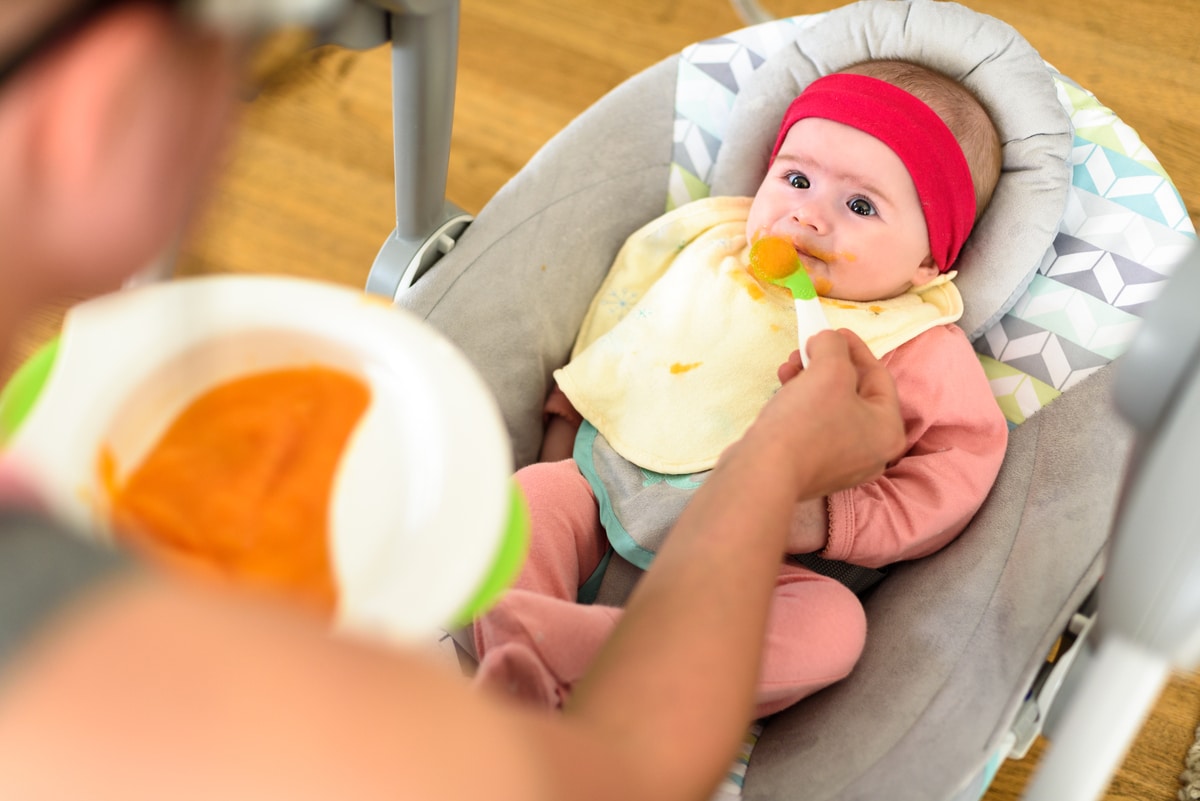


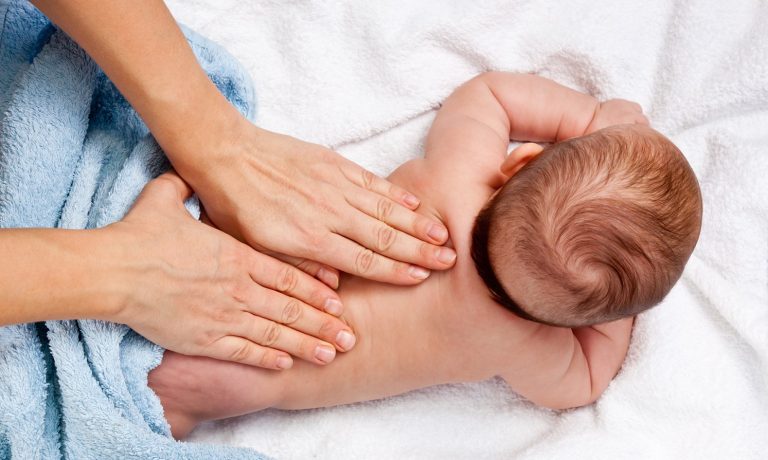
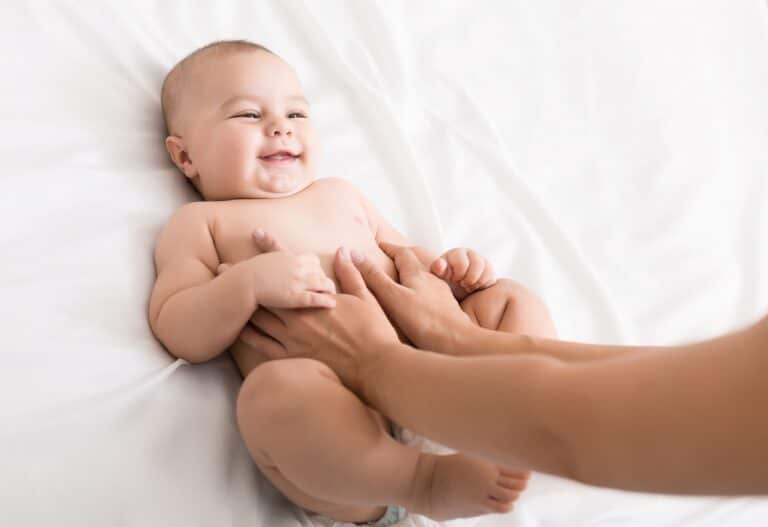




![Home Renovation Guide [2025]](/app/uploads/2021/04/design-hacks-1-378x300.jpg)
